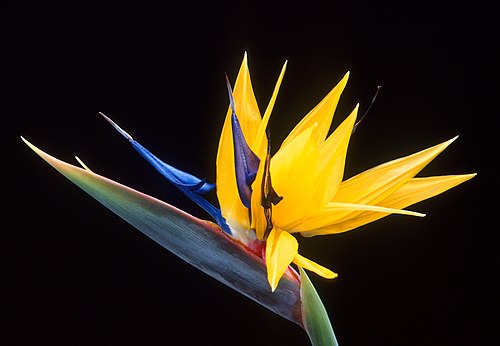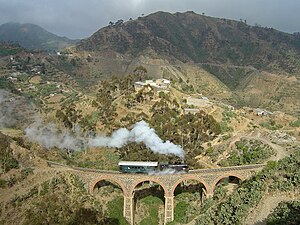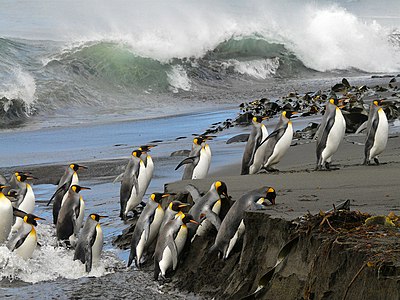Portal:Africa



Africa is the world's second-largest and second-most populous continent after Asia. At about 30.3 million km2 (11.7 million square miles) including adjacent islands, it covers 20% of Earth's land area and 6% of its total surface area. With nearly 1.4 billion people as of 2021, it accounts for about 18% of the world's human population. Africa's population is the youngest among all the continents; the median age in 2012 was 19.7, when the worldwide median age was 30.4. Based on 2024 projections, Africa's population will reach 3.8 billion people by 2099. Africa is the least wealthy inhabited continent per capita and second-least wealthy by total wealth, ahead of Oceania. Scholars have attributed this to different factors including geography, climate, corruption, colonialism, the Cold War, and neocolonialism. Despite this low concentration of wealth, recent economic expansion and a large and young population make Africa an important economic market in the broader global context. Africa has a large quantity of natural resources and food resources, including diamonds, sugar, salt, gold, iron, cobalt, uranium, copper, bauxite, silver, petroleum, natural gas, cocoa beans, and.
Africa straddles the equator and the prime meridian. It is the only continent to stretch from the northern temperate to the southern temperate zones. The majority of the continent and its countries are in the Northern Hemisphere, with a substantial portion and a number of countries in the Southern Hemisphere. Most of the continent lies in the tropics, except for a large part of Western Sahara, Algeria, Libya and Egypt, the northern tip of Mauritania, and the entire territories of Morocco and Tunisia, which in turn are located above the tropic of Cancer, in the northern temperate zone. In the other extreme of the continent, southern Namibia, southern Botswana, great parts of South Africa, the entire territories of Lesotho and Eswatini and the southern tips of Mozambique and Madagascar are located below the tropic of Capricorn, in the southern temperate zone.
Africa is highly biodiverse; it is the continent with the largest number of megafauna species, as it was least affected by the extinction of the Pleistocene megafauna. However, Africa is also heavily affected by a wide range of environmental issues, including desertification, deforestation, water scarcity, and pollution. These entrenched environmental concerns are expected to worsen as climate change impacts Africa. The UN Intergovernmental Panel on Climate Change has identified Africa as the continent most vulnerable to climate change.
The history of Africa is long, complex, and varied, and has often been under-appreciated by the global historical community. In African societies the oral word is revered, and they have generally recorded their history via oral tradition, which has led anthropologists to term them oral civilisations, contrasted with literate civilisations which pride the written word. During the colonial period, oral sources were deprecated by European historians, which gave them the impression Africa had no recorded history. African historiography became organized at the academic level in the mid-20th century, and saw a movement towards utilising oral sources in a multidisciplinary approach, culminating in the General History of Africa, edited by specialists from across the continent. (Full article...)
Selected article –
The Abir Congo Company (founded as the Anglo-Belgian India Rubber Company and later known as the Compagnie du Congo Belge) was a company that exploited natural rubber in the Congo Free State, the private property of King Leopold II of Belgium. The company was founded with British and Belgian capital and was based in Belgium. By 1898 there were no longer any British shareholders and the Anglo-Belgian India Rubber Company changed its name to the Abir Congo Company and changed its residence for tax purposes to the Free State. The company was granted a large concession in the north of the country and the rights to tax the inhabitants. This tax was taken in the form of rubber obtained from a relatively rare rubber vine. The collection system revolved around a series of trade posts along the two main rivers in the concession. Each post was commanded by a European agent and manned with armed sentries to enforce taxation and punish any rebels.
Abir enjoyed a boom through the late 1890s, by selling a kilogram of rubber in Europe for up to 10 fr which had cost them just 1.35 fr. However, this came at a cost to the human rights of those who could not pay the tax with imprisonment, flogging and other corporal punishment recorded. Abir's failure to suppress destructive harvesting methods and to maintain rubber plantations meant that the vines became increasingly scarce and by 1904 profits began to fall. During the early 1900s famine and disease spread across the concession, a natural disaster judged by some to have been exacerbated by Abir's operations, further hindering rubber collection. The 1900s also saw widespread rebellions against Abir's rule in the concession and attempts at mass migration to the French Congo or southwards. These events typically resulted in Abir dispatching an armed force to restore order. (Full article...)
Featured pictures –
Did you know (auto-generated) -

- ... that police in Indianola, Mississippi, shot an unarmed 11-year-old African-American boy after responding to his 9-1-1 call for help at his home?
- ... that a former member of the French Senate ended up being exiled to the northern Central African Republic by the future emperor?
- ... that South African physician Tlaleng Mofokeng is the United Nations special rapporteur on the right to health, and was named one of the BBC's 100 Women?
- ... that William H. Davis was the first teacher of Booker T. Washington and the first African American to be nominated as a candidate for West Virginia governor in 1888?
- ... that Godwin Obasi has been described as "Africa's gift to the world of climate science"?
- ... that goalkeeper Sophie Whitehouse, who has lived in England, Africa and the US, has been chosen to play soccer for the Republic of Ireland?
Categories
Selected biography –
Jean-Joseph Rabearivelo (4 March 1901 or 1903 – 22 June 1937), born Joseph-Casimir Rabearivelo, was a Malagasy poet who is widely considered to be Africa's first modern poet and the greatest literary artist of Madagascar. Part of the first Malagasy generation raised under French colonization, Rabearivelo grew up impoverished and failed to complete secondary education. His passion for French literature and traditional Malagasy oral poetry (hainteny) prompted him to read extensively and educate himself on a variety of subjects, including the French language and its poetic and prose traditions. He published his first poems as an adolescent in local literary reviews, soon obtaining employment at a publishing house where he worked as a proofreader and editor of its literary journals. He published numerous poetry anthologies in French and Malagasy as well as literary critiques, an opera, and two novels.
Rabearivelo's early period of modernist-inspired poetry showed skill and attracted critical attention, but adhered strictly to traditional genre conventions. The surrealist poetry he composed beginning in 1931 displayed greater originality, garnering him strong praise and acclaim. Despite increasing critical attention in international poetry reviews, Rabearivelo was never afforded access to the elite social circles of colonial Madagascar. He suffered a series of personal and professional disappointments, including the death of his daughter, the French authorities' decision to exclude him from the list of exhibitors at the Universal Exposition in Paris, and growing personal debt worsened by his opium addiction and philandering. Following Rabearivelo's suicide by cyanide poisoning in 1937, he became viewed as a colonial martyr. (Full article...)
Selected country –
 |
 |
||

| |||
Namibia, officially the Republic of Namibia, is a country in southern Africa on the Atlantic coast. It shares borders with Angola and Zambia to the north, Botswana to the east, and South Africa to the south. It gained independence from South Africa in 1990 and its capital city is Windhoek (German: Windhuk). It is divided into 13 regions and subdivided into 102 constituencies. Namibia is a member state of the United Nations (UN), the Southern African Development Community (SADC), the African Union (AU), and the Commonwealth of Nations.
The politics of Namibia takes place in a framework of a presidential representative democratic republic, whereby the President of Namibia is elected to a five year term and is both the head of state and the head of government, and of a multi-party system. Executive power is exercised by the government. Legislative power is vested in both the government and the two chambers of parliament. The Judiciary is independent of the executive and the legislature. (Read more...)
Selected city –
Beira (Portuguese pronunciation: [ˈbejɾɐ]) is the capital and largest city of Sofala Province, in the central region of Mozambique.
Beira is where the Pungwe River meets the Indian Ocean. It is the fourth-largest city by population in Mozambique, after Maputo, Matola and Nampula. Beira had a population of 397,368 in 1997, which grew to 530,604 in 2019. A coastal city, it holds the regionally significant Port of Beira, which acts as a gateway for both the central interior portion of the country as well as the land-locked nations of Zimbabwe, Zambia and Malawi. (Full article...)
In the news
- 12 February 2025 – Sudanese civil war
- Darfur campaign
- The Rapid Support Forces storm the Zamzam Refugee Camp in North Darfur, Sudan, the country's largest displacement camp. The situation inside the camp, which holds around 500,000 people, is described as "catastrophic", with an unknown number of casualties. (BBC News)
- 12 February 2025 – Russia–Sudan relations
- Sudanese foreign minister Ali Yousif Sharif reports that an agreement has been reached for the creation of a Russian naval base in Sudan. (Al Arabiya)
- 11 February 2025 – Kivu conflict
- Rwandan-backed M23 rebel forces initiate advances towards Bukavu, the capital of South Kivu in the eastern Democratic Republic of the Congo (DRC), following a two-day unilateral ceasefire. (Al Jazeera)
- 11 February 2025 – War against the Islamic State
- At least 27 Puntland soldiers and more than 70 ISIL militants are killed or wounded in fighting around the Togga Jacel area of the Cal Miskaad mountains in Puntland’s Bari Region. This is the deadliest attack since Puntland launched an offensive in December 2024 against Islamic State in Somalia hiding in the Golis Mountains. (VOA) (Reuters) (Garowe Online)
- 11 February 2025 – Jordan–United States relations
- King Abdullah II of Jordan meets U.S. President Donald Trump in Washington D.C. for talks focusing on the president's proposal for the removal of Palestinians from the Gaza Strip and a subsequent United States takeover of the region, with President Trump threatening to withhold aid from Jordan and Egypt if they do not agree to the proposal. (ABC News)
Updated: 3:05, 13 February 2025
General images -
Africa topics
More did you know –
- ...that Iyabo Obasanjo-Bello, a Nigerian Senator from the People's Democratic Party, is the daughter of former President Olusegun Obasanjo?
- ...that the 2007 South Africa miners' strike, which impacted over 240,000 workers, was the first ever industry-wide miners' strike in the history of South Africa?
- ...that Seleh Leha, a town in Tigray Region in northern Ethiopia, was the site of a leprosarium built during the Italian occupation of East Africa and abandoned in 1941?
- ...that Sarir field, an oil field in Cyrenaica operated by the Arabian Gulf Oil Company (AGOCO), is considered to be the largest in Libya, with estimated oil reserves of 12 Gbbl (1.9×109 m3)?
Related portals
Major Religions in Africa
North Africa
West Africa
Central Africa
East Africa
Southern Africa
Associated Wikimedia
The following Wikimedia Foundation sister projects provide more on this subject:
-
Commons
Free media repository -
Wikibooks
Free textbooks and manuals -
Wikidata
Free knowledge base -
Wikinews
Free-content news -
Wikiquote
Collection of quotations -
Wikisource
Free-content library -
Wikispecies
Directory of species -
Wikiversity
Free learning tools -
Wikivoyage
Free travel guide -
Wiktionary
Dictionary and thesaurus

























































































